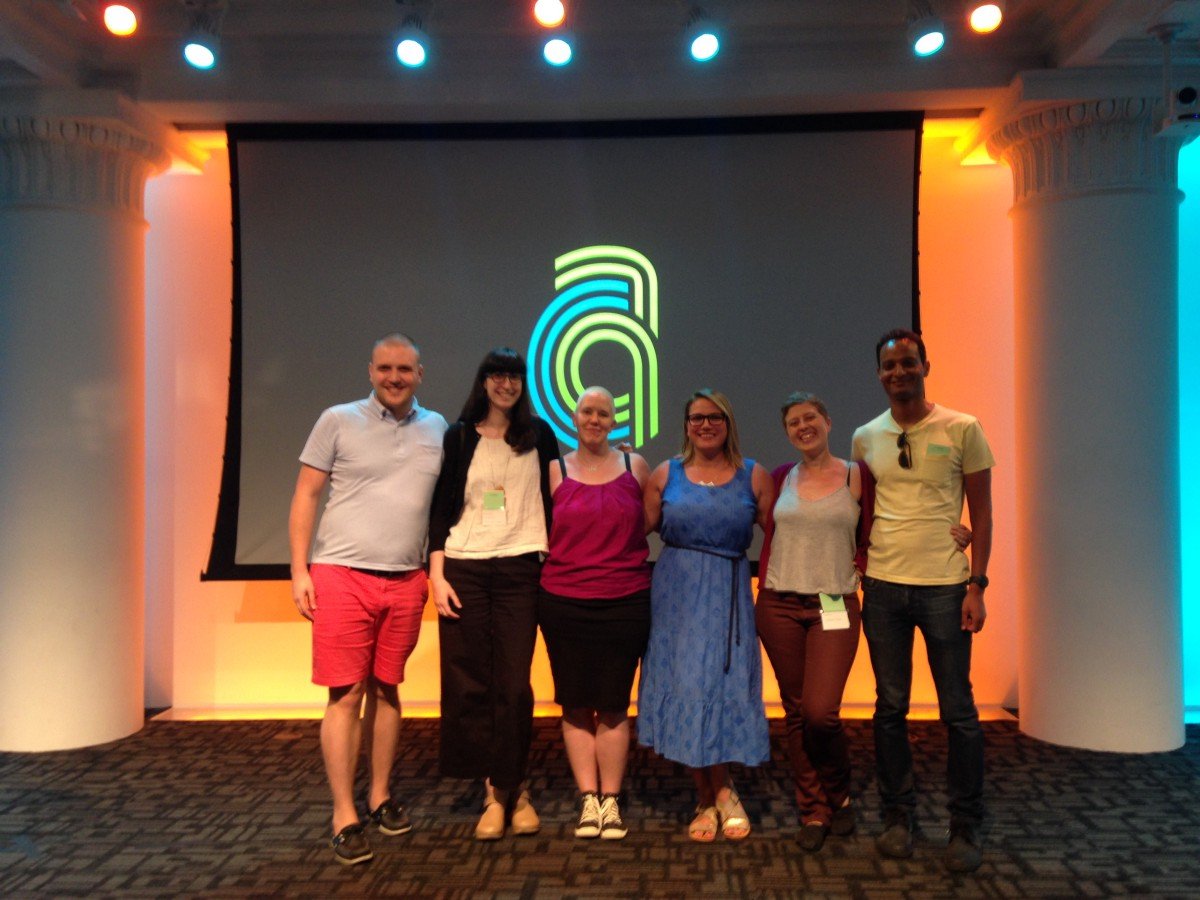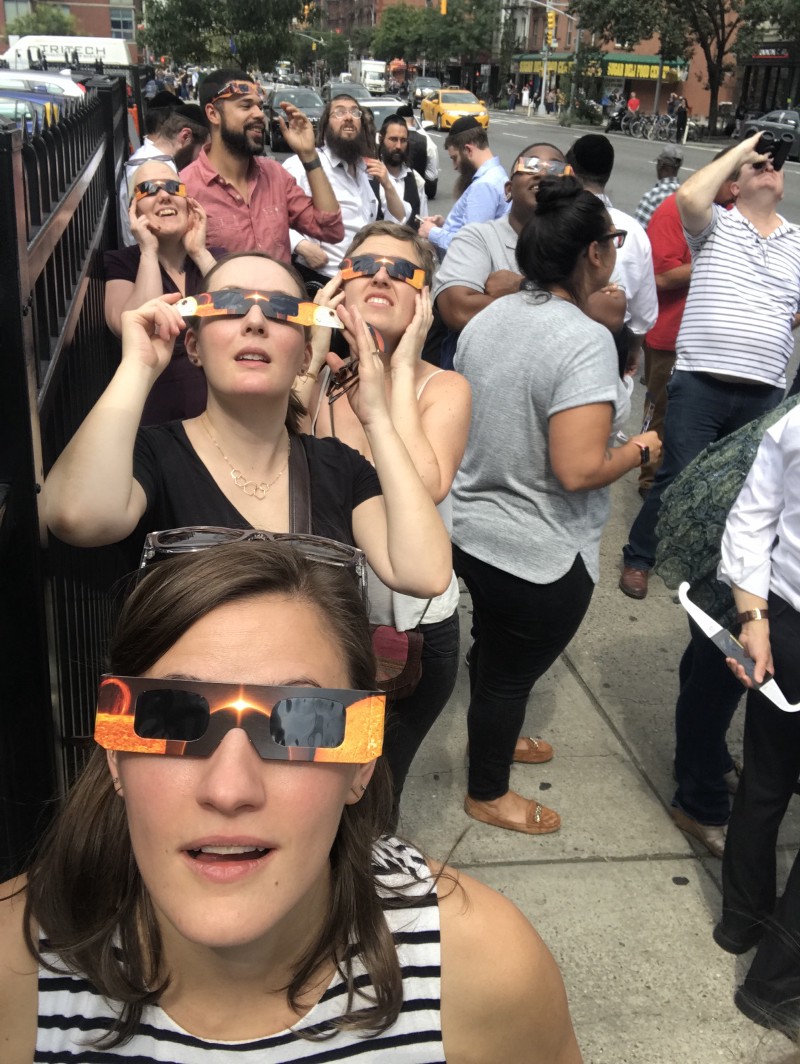Our Trip to AlterConf NYC

Fractured Atlas’s offices are in New York City, but most of our software development team works remotely. So, while we see each other during conference calls and chat on a daily basis, the on-site and remote staff don’t often get the chance to hang out in person. But when there’s an opportunity to hang out and talk about social justice? Sign us up!
Last month, members of our Product, Engineering, and People teams got the chance to attend AlterConf NYC, a conference focused on marginalized people and those who support them in the tech and gaming industries. (As of September 2017, they have conferences coming up in Australia, Oregon, and San Francisco — check ’em out.)
What got you excited about going to AlterConf NYC?
Tasha Jones, Software Developer
I had attended AlterConf in Washington, D.C., in the past and it was amazing. I couldn’t pass up on a second opportunity to experience it.
Selena Juneau-Vogel, Director of Product Management
Tasha! She was so excited about it, I just went with her recommendation. Also, I was excited to meet Angelique in person for the first time.
Angelique Weger, Senior UX Engineer
I went to AlterConf DC last year and still reference some of the great talks from that event. Plus, I was jazzed there was enough interest across our company that I would be able to attend with and meet coworkers!
What aspects of the conference environment or setup impressed you the most?
Marcus Swift, Product Management Specialist
The organizers made a thoughtful effort to make sure the event was accessible to as many people as possible. They had conference rooms set up for people to take a break if they needed one, childcare was available, sign language interpreters were present, and talks had thorough content warnings. What blew me away the most, though, was the open captioning/live transcribing of the talks on two displays above the stage.
At first, the speed of the captioning was disorienting. But, as someone who watches a lot of shows with closed captioning, I really appreciated them being there, along with the stenographer’s skill in transcribing the talk for everyone to read it.
Tasha Jones
The organizers provided attendees with multi-colored slips of paper to indicate our level of interest in social interaction. A green paper was used to indicate that you’re happy to speak with anyone, while the yellow indicated a preference for interacting with people who you already know, and the red paper indicated that you need space.
As a person who swings pretty dramatically from feeling social to feeling like I need to have some personal time, I’d really love to see these at other conferences in the future. I definitely saw attendees and speakers taking advantage of these as a tool for nonverbal communication.
What were your biggest takeaways from the presenters at AlterConf?
Selena Juneau-Vogel
Over the span of several presentations, I started to hear a theme I’m calling “how might we adjust so everyone can contribute?”
A talk called “Design Ethics: Inclusivity in the Design Process” made me think: how can we adjust our software development process to include more perspectives without slowing down our commitment to agile and iterative deployment too much?
A talk called “Low Spoons Leadership” introduced me to “Spoon Theory,” and made me think: how can we better adjust for one another’s emotional and physical capacity?
And a talk called “Integrating Family & Career: Ensuring Women’s Dreams Continue to Take Flight After Motherhood” included a striking comparison: the hormones produced during pregnancy are more intense and span a shorter period of time than those produced during puberty. This reality impacts many pregnant individuals’ decision-making capacity.
The speaker was pregnant herself, and was by no means suggesting that we take away or discount pregnant people’s decision making. Instead, she is working to develop AI technology to help pregnant people feel confident making their own decisions throughout pregnancy and the postpartum period. Also, attendees pointed out that people other than cis-gendered women can be pregnant.
So, what’s the takeaway here? Maybe it’s only awareness at this stage, but there’s so much more we can do to accept ourselves and our colleagues as humans, while also respecting their varied contributions.
Angelique Weger
I was very impressed by the talks that specifically addressed issues of poverty, illness, and disability within tech communities and teams, not just as people or issues tech can help/address. I hope the broader tech community engages with those topics. Also, Seán Hanson gave a talk on “Quiet Developers” that really helped gel a lot of thoughts I’d been having about who is visible in the tech communities I participate in, and at the conferences I attend. I expect I’ll be referencing his talk for months to come.
Tasha Jones
So many of the talks were really amazing. Seán Hanson’s talk on “Quiet Developers” was full of really valuable perspective that I didn’t have before. I recommend reading his blog post on the topic.
Also, as a person who accidentally volunteers herself for things WAY too much, Emily Metcalfe’s talk on “Low-Spoons Leadership” was really helpful.
I definitely feel like I had something to take away from every talk there, and I’m so grateful to each of the speakers for their time.

Marcus Swift
Christine Bryant-Ryback gave a talk titled “Standing Desks and Free Pizza: Body Image Negotiations in Tech Spaces” that offered so much to consider about navigating body image in the workplace.
The talk ranged from how “all bodies are good” philosophies can be unintentionally exclusive to people who may have legitimate reasons for finding their bodies problematic, to making sure that office wellness programs are optional and offer ways of including everyone in the office— taking into account both visible and invisible disabilities.
Katriel Paige’s presentation on “The Privilege of Making” raised great questions about the intersection of space, making, and privilege. How do we ensure makerspaces are equitable and affordable? What are the gendered and socio-economic implications of terms like “making,” “crafting,” and “DIY?” How does the value of time and leisure factor into class in tech? As online shopping makes tech and other goods cheaper, are we leaving people behind who can’t access goods at cheaper prices because it’s not feasible or safe to have packages shipped to them? I know I’ll be thinking about these questions for a long time.
What other conferences or events are you excited about attending this year?
Selena Juneau-Vogel
In a few weeks, I’m headed to San Jose for my first Women in Product conference. Also, our VP of Engineering and I are submitting presentation proposals to a few tech conferences coming up. We’re excited to talk about the product+engineering team process we’ve developed and be inspired from others to keep improving. Be sure to follow us to hear more.
Tasha Jones
I’m excited to be speaking at Windy City Rails in September, which will be extra fun since a couple members of our team will be meeting up there. Our team is fully remote, so it’s pretty exciting when we get to see each other in 3D. If you’re at Windy City Rails, be sure to say hi!
About Fractured Atlas
Fiscal sponsor, fundraising platform, educational resource, advice from a staff of experienced artists & creatives. We’re rooting for you!

